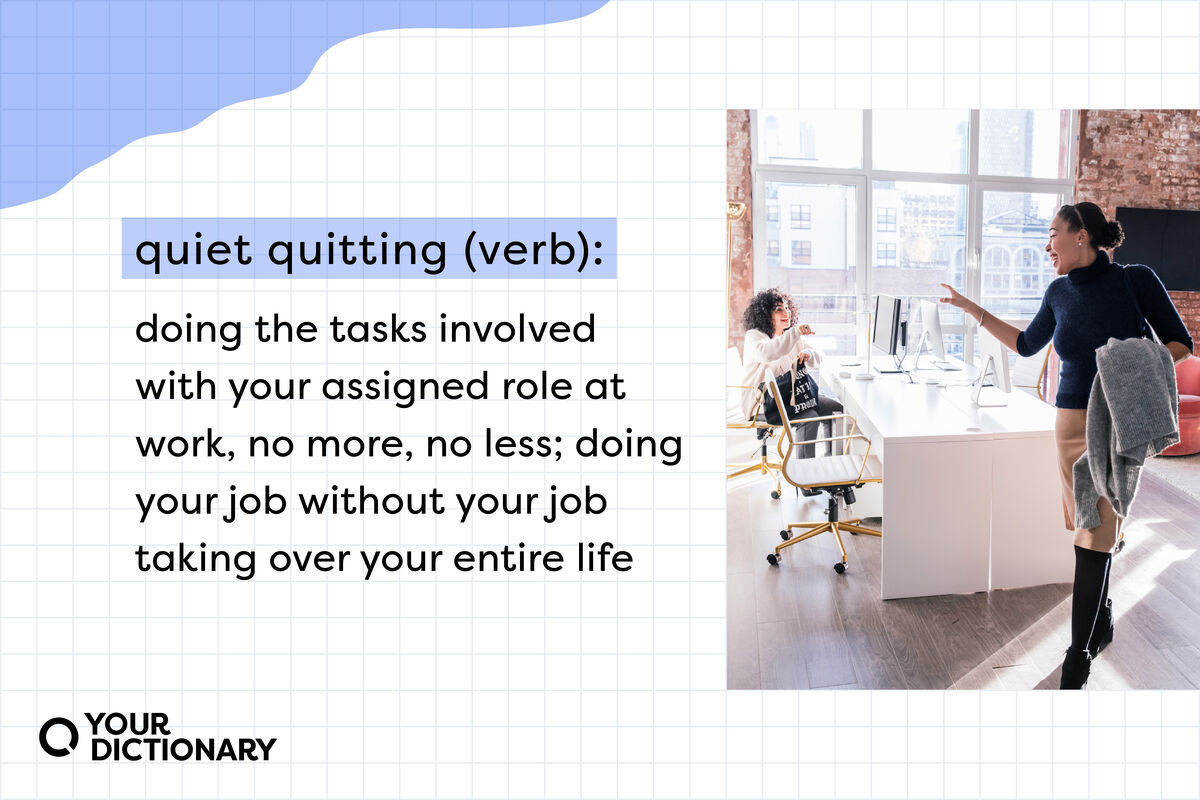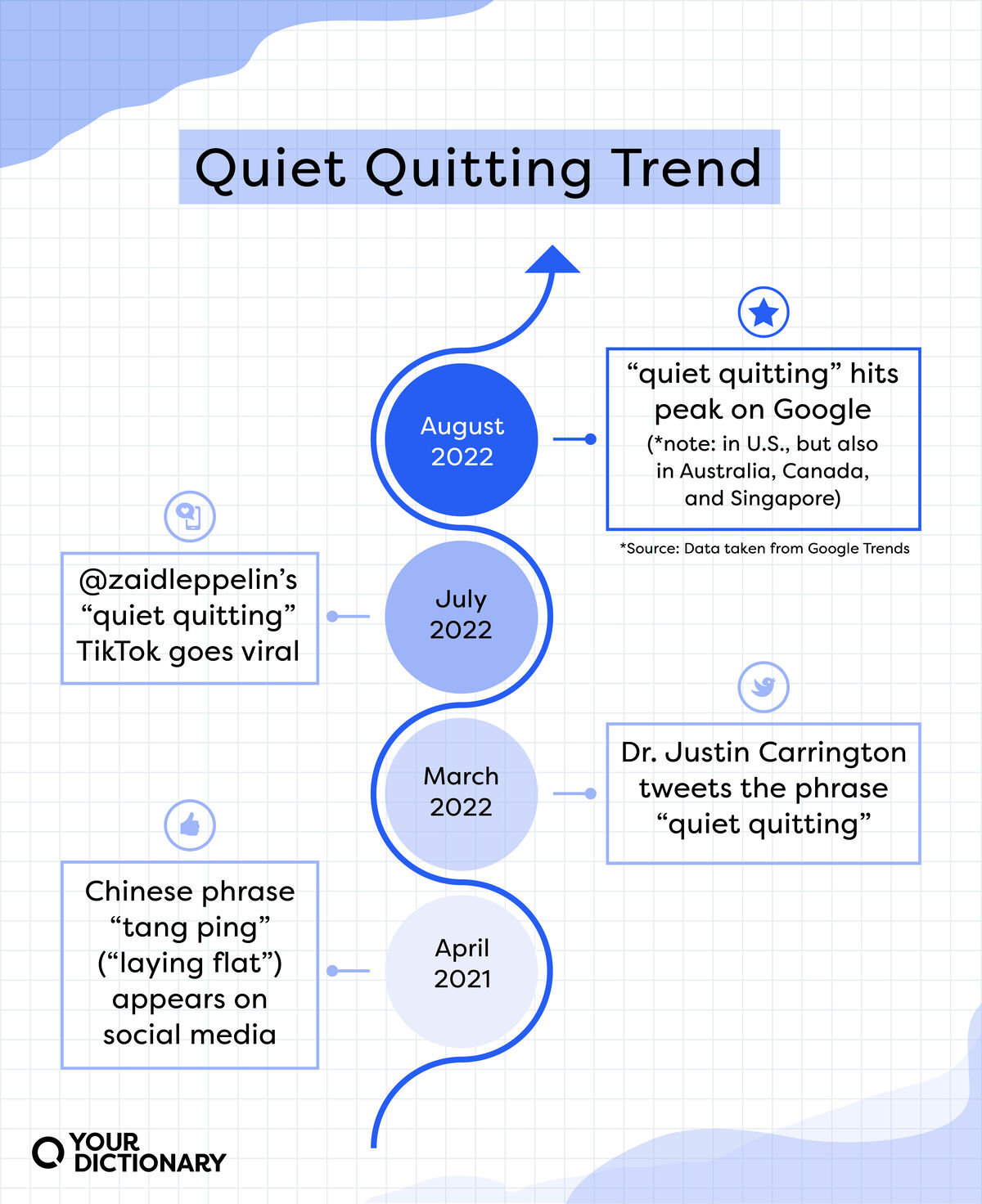
In a world full of noise and excess hustle and bustle, quiet quitting sounds like the pleasant respite that we could all benefit from. It’s the buzz phrase that’s been making the rounds, but what is quiet quitting?
The Meaning of “Quiet Quitting”
Quiet quitting is a bit of a misleading phrase. It has nothing to do with noise. You could be quiet quitting while screaming at the top of your lungs (not recommended). It also doesn’t actually involve you quitting your job.
Quiet quitting refers to not overworking yourself or doing extra things that you won’t get compensated for; you’re not an underachiever but also not an overachiever.
It’s doing the tasks involved with your assigned role, no more, no less.
Simply put, it’s doing your job without your job taking over your entire life.
The quiet quitting movement comes at a time when exploitative labor, hustle culture, and work-life imbalances have come to a head, all of which have contributed to high rates of worker burnout.
Quiet Quitting in School
While it started in the workplace, quiet quitting has spilled over into schools, particularly among college students. About a third of surveyed college students said they were quiet quitting school, which comes as a direct response to the pandemic and the shift to online classes.
It’s not exactly a new idea. If you’ve heard the saying “C’s get degrees,” you’re on a similar track here, though this is more about students actively focusing on their own mental health and wellbeing. This gets a little fuzzy because school and learning in general are intentionally challenging, but there’s a difference between overcoming challenges and being asked to constantly pull all-nighters or take tests with terrible grading curves.
Quiet Quitting in Relationships
A little more troubling, quiet quitting has entered the realm of personal and romantic relationships. Quiet quitting relationships (sometimes referred to as quiet dumping) involves you barely trying within your relationship, like not going on dates anymore or not celebrating significant days. Quiet quitting makes sense in a job setting (why work more if you’re not getting paid more for it?) but it doesn’t transfer over to personal relationships so well.
Quiet quitting relationships is better known as romantic disengagement, which, well, isn’t great. Any good relationship, romantic or otherwise, involves developing healthy boundaries, but that requires open communication. Quiet quitting a relationship kills that communication, which is hurtful and manipulative to your partner, and you’re ultimately depriving yourself. If it’s a true, irreconcilable issue, you should break up and find a more rewarding relationship.
Essentially, you don’t owe a large corporation your emotional support or care; you do owe that to someone you (ostensibly) love.
Where Did “Quiet Quitting” Come From?
The phrase quiet quitting was initially coined in March 2022 in a tweet. However, the phrase reached true popularity in a TikTok from July 2022. The idea gained traction in the middle of August 2022.
The roots of quiet quitting go even farther back to at least April 2021 on Chinese social media. The Chinese trend tang ping, or “lying flat,” essentially means the same thing as quiet quitting: avoiding overwork, not making your job your only thing in life, and otherwise living a happy, healthy life.

How To Say “Quiet Quitting” IRL
Most people use quiet quitting as a verb or as a gerund (a precious verbing noun).
- I’m quiet quitting after spending so many nights working overtime without pay.
- The quiet quitting was spreading through the office, and the employees seemed so much happier for it.
- “For employers that are dealing with workers who may exhibit signs of quiet quitting, Zitron has one simple message for them: Pay them for extra work.” - NPR
Can I Say “Quietly Quitting”?
Note that most people take quiet quitting as its own full phrase, even though grammatically you might want to turn quiet into an adverb that modifies quitting. Some publications have used this form of the phrase, but it's easy to confuse with people actually quietly resigning from their jobs.
- “They wish they could quietly quit, but believe they could never get away with it because of their race or gender.” - The New York Times
- “Employees who are quietly quitting are also likely the ones who have been silently suffering in a psychologically unsafe environment.” - The Washington Post
What Is a “Quiet Quitter”?
Some have also taken to using quiet quitters to describe the people who are quiet quitting.
- “Aside from providing his employees remote-work flexibility and on-site perks at the office, he says his workplace lacks quiet quitters because he values employees’ moments of pushback.” - TIME
- “Perkins advises would-be quiet quitters to ‘scale back slowly’ and ‘quietly’ — not drawing too much attention to the change.” - Business Insider
Examples of Quiet Quitting at Work
If you’re not sure what quiet quitting might actually look like, don’t worry, you’re not alone. The fact is, quiet quitting is a pretty broad concept that can mean a lot of different things to different employees.
It can look like:
- Closing your laptop and logging off of your computer at exactly 5:00 p.m. instead of continuing to work until 5:30, 6:00, 6:30…
- A copywriter saying no to organizing a whole industry-wide conference on their own
- A minimum wage worker refusing to work unpaid overtime
- A programmer refusing to get work done while on vacation with his family
- A teacher staying active and engaged from 8:00 a.m. to 4:00 p.m. and not taking work home
- Being more aware of how often you think about meaningless work matters when you’re out with friends and family
Is Quiet Quitting Good or Bad?
If you’re a C-level executive, don’t read this: For most people, quiet quitting is largely a good thing. It’s workers setting boundaries, understanding their labor power, prioritizing things outside of work, and maintaining a better work-life balance.
For CEOs, quiet quitting might not seem ideal, but workers who are happy and content will probably work quicker and harder. If it’s an actual problem, CEOs can also consider providing better compensation and benefits, reducing exploitative hours, and otherwise supporting workers.
Is the Phrase “Quiet Quitting” Good or Bad?
The phrase itself has come under some scrutiny and criticism, even among people in favor of labor rights. Using the word quitting assumes a sense of failure or that employees are in the wrong when, in reality, the concept largely involves just doing your job. Some people have turned to “quiet working” as an alternative phrase for the same thing.
Other Terms Related to “Quiet Quitting”
The cool thing about language and slang is that it’s constantly evolving with us as we change how we live and work and play. That naturally means you’re going to run into a lot of phrases that are tied to quiet quitting in some way.
Quiet Firing
Something of a response to quiet quitting, “quiet firing” involves employers treating their employees poorly, hoping they will quit but not actually firing them outright.
The Great Resignation
Also known as the “Great Reshuffle” or the “Big Quit,” the “Great Resignation” is a trend of employees leaving their jobs. This began in early 2021 as a response to a consistent rise in the cost of living without an equal rise in wages to balance it out, safety concerns involving COVID-19, and ongoing job dissatisfaction.
Crunch Culture
While it’s most often associated with video game developers, “crunch culture” has affected different companies and industries. Crunch culture is the antithesis of and one reason for quiet quitting. It’s characterized by a perpetual “crunch time.” Think 100-hour work weeks (including weekends) with no overtime pay, for months on end.